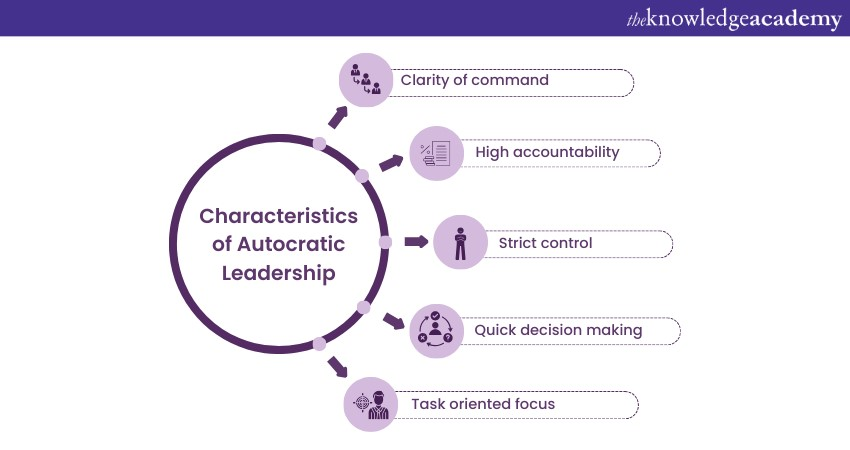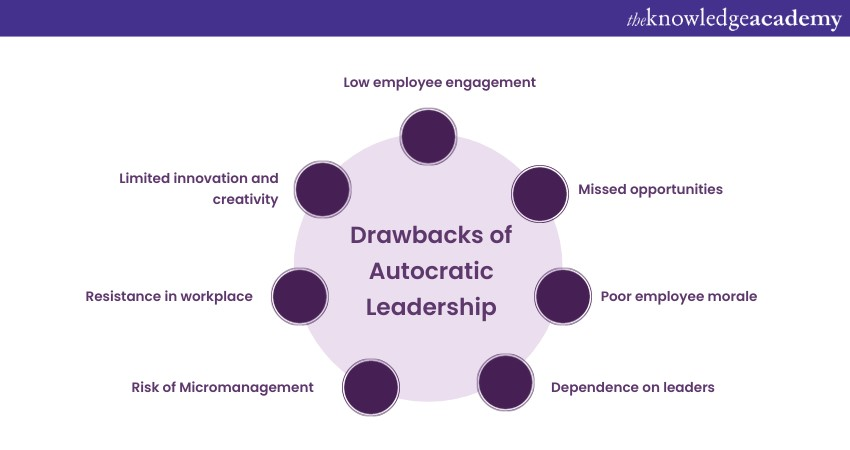We may not have the course you’re looking for. If you enquire or give us a call on 01344203999 and speak to our training experts, we may still be able to help with your training requirements.
Training Outcomes Within Your Budget!
We ensure quality, budget-alignment, and timely delivery by our expert instructors.

If you want to become a true leader, then finding the right Leadership style can be one of the most important decisions to make. One Leadership style that stands out from the rest is Autocratic Leadership, known for its authoritative nature. So, anyone who wants to land a Leadership role must understand What is Autocratic Leadership. So, what are you waiting for? Read this blog to learn What is Autocratic Leadership including its characteristics, advantages, drawbacks and its role in your business.
Table of Contents
1) What does Autocratic Leadership mean?
2) Characteristics of Autocratic Leadership
3) Role of Autocratic Leadership in business
4) Advantages of Autocratic Leadership
5) Drawbacks of Autocratic Leadership
6) Conclusion
What does Autocratic Leadership mean?
Autocratic Leadership is a centralised approach where the decisions made are not discussed with the employees or related teams. A single person or a very small group of individuals have the authority to make decisions in an Autocratic Leadership system. Although this approach is considered quick and efficient, it does prove to be less collaborative and innovative.
The significance of this type of Leadership depends upon the context and the specific needs of the organisation or situation. Often, leaders are required to adapt to the principles of Autocratic Leadership based on the strengths and weaknesses of the team or workplace. Based on the qualities of the leaders, the autocratic approaches can be integrated whenever necessary to ensure that the overall functioning of the organisation is not affected.
Characteristics of Autocratic Leadership
Autocratic Leadership is a type of Leadership which provides a high degree of control over teams. To understand What is Autocratic Leadership, it is crucial to understand the key characteristics of this type of Leadership. The following is the list of its characteristics, so let’s have a quick look at them:

Clarity of command
One of the prominent characteristics of Autocratic Leadership is clarity of command in decisions made at a central level. The structure of an Autocratic system allows the leaders to implement their commands without any questions or suggestions from employees. This includes a pre-defined specific derivative which needs to be followed without considering innovation and iterative ideas of the process.
High accountability
Autocratic Leadership emphasises on high-level accountability of the decision-maker. Since the leader makes the decision independently, they are responsible for the outcomes, both positive and negative.
In cases where only one person holds accountability and responsibility for the decision, the teams involved might feel a lack of ownership, which can lead to low productivity.
Strict control
Autocratic Leadership offers strict control over the development and implementation process. The leaders are solely responsible for the outcomes of the decisions, and they seek total control over the teams and organisation to ensure that the task is executed as per their directives. This provides assurance of consistency and compliance with the industry standards, making the process easier for the employees.
Quick decision making
Quick decision-making is a fundamental skill of an Autocratic Leader. Autocratic Leadership does not rely on feedback and input from employees, which in turn makes the process quick. It can be crucial in situations demanding urgent attention and time-sensitive solutions for the business. Quick decision-making lacks the involvement of diverse perspectives, which can be a reason for overlooking valuable insights by the decision-makers.
Task oriented focus
Autocratic Leadership has a strong emphasis on tasks and objectives. It prioritises efficiency in goal completion and result-driven strategies. This approach helps teams to be more productive and focused on the task. The downside of task-oriented focus is that it might affect employee engagement and long-term strategic planning.
Master the art of people management and team Leadership. Sign up for our Successful People Management And Team Leadership Course today!
Role of Autocratic Leadership in business
Autocratic Leadership is of utmost importance in a business. Before understanding the role of Autocratic Leadership in business, it is essential to recognise that Autocratic Leadership is not universally applicable or suitable for all situations. However, there are situations where its characteristics and role can be advantageous for a business.
It is important for leaders to integrate the principles of different types of Leadership to lead the business effectively towards success. Autocratic Leadership enables leaders to manage crises, maintain order and discipline, and assure consistency and standardisation. These roles are not only restricted to this Leadership style, but they can also be implemented in Democratic Leadership as well.
While it enables quick and focused decision-making, it limits valuable collaboration and participation of teams at various levels. In several cases, Autocratic Leadership can offer the bandwidth to make important decisions solely based on personal insights and perspectives. Its effectiveness depends on the circumstances and organisational culture.
Advantages of Autocratic Leadership
While the concept of Autocratic Leadership is highly criticised for several reasons, it is important to consider some of its advantages. Its advantages include the following:
Strategic vision
Autocratic leaders often have a strategic vision for an organisation. Their ability to set clear goals and objectives can possibly help the organisation drive towards specific objectives and align efforts to achieve long-term objectives.
Accountability
As mentioned earlier, accountability is a primary characteristic advantage of Autocratic Leadership. Autocratic leaders are held accountable for both the positive and negative outcomes of the decisions made. This accountability can create a strong sense of responsibility and ownership among leaders.
Decisive leadership
Autocratic Leadership is often considered a confident and decisive approach. This can instil confidence in the teams, especially during uncertain and challenging times. Employees and teams might feel reassured knowing that there is a tough leader to make crucial decisions when needed.
Decision making
Autocratic Leadership is all about making the most suitable decision. As this type of Leadership does not include the participation of other employees in the decision-making process, it makes the process quick.
Consistency and standardisation
Consistency and standardisation play a crucial role in business processes like franchising, quality control and operations. Autocratic Leadership can ensure that the processes, products, and services stick to specific industry and other legal standardisations. This can be essential to maintain brand reputation and customer satisfaction.
Drawbacks of Autocratic Leadership
Autocratic Leadership, characterised by its unbalanced authoritative and central approach, has several significant drawbacks and limitations. In modern businesses where collaboration, innovation, and partnerships are highly valued, an Autocratic system would not be a suitable choice. Some of the drawbacks of this type of Leadership are as follows:

Low employee engagement
Autocratic Leadership depends solely on the decision-making capabilities of the leaders. The lack of participation of employees and teams in the decision-making process can lead to a disengaged workforce. Over time, this can reduce employee engagement, leading to lower motivation and job satisfaction.
Limited innovation and creativity
Autocratic Leadership can totally choke innovative and creative approaches in any business. When employees are not encouraged to share their ideas and perspectives on the novel solution, the overall creativity of the organisation can suffer. This also can hinder the organisation’s ability to adapt to the changing market to stay competitive.
Resistance in workplace
Employees working under an Autocratic leader might become resistant to their directives, which can lead to workplace conflict or tension; often, when employees feel that their voice is not being heard and their views do not make any impact in the organisation, a sense of discontent and resistance can spread in the workplace.
Risks of micromanagement
Autocratic leaders might be prone to micromanagement, where they excessively oversee and control the day-to-day tasks and targets of their employees. This level of excessive management can be demoralising and counterproductive as it reflects a lack of trust and undermines autonomy.
Want to unlock your Leadership potential? Sign up for our Leadership Skills Course now!
Dependence on leaders
Autocratic Leadership stand on a culture that promotes only leaders in an organisation. The dependence on the leader for all decisions and directions can be problematic in cases where the leader is overwhelmed or absent. In such cases, the organisation may struggle to function effectively without constant guidance.
Poor employee morale
In broader terms, Autocratic Leadership can lead to poor employee morale. This can lead to disempowered and undervalued employees who are less likely to be satisfied with their work and may not put their best efforts into achieving business objectives.
Missed opportunities
Autocratic leaders might overlook valuable insights and alternative viewpoints by not involving other teams and employees in the decision-making processes. This can result in missed opportunities and difficulty keeping up with market trends. This can also be very harmful from a business perspective and can hinder growth and scalability.
Conclusion
We hope that this blog helped you understand What is Autocratic Leadership, its characteristics, roles in your business and more. While this Leadership style may have its use cases in specific situations of emergency or when quick decisions are needed, it is generally advisable for leaders to adopt a more flexible and adaptive approach that takes into consideration the needs and contributions of their team members.
Take your Leadership skills to the next level by signing up for our Leadership Training today!
Frequently Asked Questions
Upcoming Business Skills Resources Batches & Dates
Date
 Leadership Skills Training
Leadership Skills Training
Fri 31st May 2024
Fri 28th Jun 2024
Fri 26th Jul 2024
Fri 30th Aug 2024
Fri 27th Sep 2024
Fri 25th Oct 2024
Fri 29th Nov 2024
Fri 27th Dec 2024







 Top Rated Course
Top Rated Course



 If you wish to make any changes to your course, please
If you wish to make any changes to your course, please


